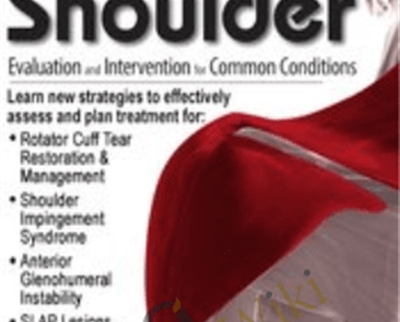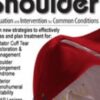$199.99 Original price was: $199.99.$76.00Current price is: $76.00.
Full Day
If you are looking for SOLUTIONS to the evaluation and treatment of complex shoulder pathologies, this is the seminar for you.
Join expert Michael T. Gross, PT, PhD, FAPTA, for an information-packed day focused on giving you the tools you need to overcome the sometimes difficult task of intervening for shoulder injuries.
 Purchase this course you will earn 76 Points worth of $7.60
Purchase this course you will earn 76 Points worth of $7.60Elevate your skills with the The Complex Shoulder: Evaluation & Intervention for Common Conditions – Michael T. Gross course, available for just $199.99 Original price was: $199.99.$76.00Current price is: $76.00. on Utralist.com! Browse our curated selection of over 60,000 downloadable digital courses across diverse Uncategorized. Benefit from expert-led, self-paced instruction and save over 80%. Start learning smarter today!
If you are looking for SOLUTIONS to the evaluation and treatment of complex shoulder pathologies, this is the seminar for you.
Join expert Michael T. Gross, PT, PhD, FAPTA, for an information-packed day focused on giving you the tools you need to overcome the sometimes difficult task of intervening for shoulder injuries. Learn new strategies to assess and plan treatment effectively for:
- Rotator Cuff Tear Restoration & Management
- Shoulder Impingement Syndrome
- Anterior Glenohumeral Instability
- SLAP Lesions
- Adhesive Capsulitis
- Thoracic Outlet Compression Syndrome
- Shoulder Arthroplasties
Learn more than just the etiology of these common shoulder complex pathologies. Learn how to interpret clinical tests and recognize the patient’s problem quickly. Rapid recognition is imperative not only in developing the appropriate course of action for the patient, but also ensuring the patient has the best chance for a successful rehabilitation. Acquire take-home tips and techniques that will change your clinical practice the very next day!
OUTLINE
Rotator Cuff Tears
- Surgical restoration of normal and altered anatomy
- Cluster tests, modified empty can test
- Anatomic repair vs. “the best you can do”
- Conservative management
- Post-operative management
Shoulder Impingement Syndrome
- Anatomic and functional contributors
- Cluster tests, modified Hawkins-Kennedy, modification of Neer’s test
- Surgical repair procedures for primary impingement
- Conservative management based on etiologic factors
- Post-operative management
Anterior Glenohumeral Instability
- Anatomic restraints
- Etiologic factors
- Apprehension, Jobe Relocation, Release Test, Anterior Drawer, Push-Pull
- Anatomic Repair, Bristow, Laterjat, Putti-Platt
- Rehabilitative management
SLAP Lesions
- Classification of lesions
- Biceps Load II, Anterior Slide Test
- Surgical management and rehabilitation based on lesion type
Adhesive Capsulitis
- Stages based on symptoms
- Etiologic factors
- Effects of conservative versus invasive intervention
- Conservative management based on stage of disorder
- Anterior, Posterior, Inferior Glenohumeral Mobilizations and Scauplo-thoracic Mobilizations
Thoracic Outlet Compression Syndrome
- Anatomic locations of potential compromise
- Etiologic factors in each anatomic location
- Intervention based on location of compromise and etiologic contributors
- Assessment Tests: Adson’s, Military Bracing, Hyperabduction
- Surgical Procedures: Cervical Rib Excision, Scalenectomy
Shoulder Arthroplasties
- Indications for
- Hemi-arthroplasty
- Total shoulder arthroplasty
- Reverse total shoulder arthroplasty
- Outcomes
- Rehabilitation strategies
Review of Special Tests and Mobilizations – Lab
OBJECTIVES
- Explain the etiology of common shoulder complex pathologies and identify possible anatomic and functional movement etiologic factors
- Identify which special tests should be used to identify specific shoulder complex pathologies and be able to apply these tests proficiently
- Determine which patients are appropriate candidates for conservative intervention or should be referred for assessment as surgical candidates
- Utilize effective glenohumeral and scapula-thoracic mobilization techniques specific to shoulder complex pathologies
- Devise appropriate treatment plans and enable effective patient intervention based on clinical findings
Tag: The Complex Shoulder: Evaluation & Intervention for Common Conditions – Michael T. Gross Review. The Complex Shoulder: Evaluation & Intervention for Common Conditions – Michael T. Gross download. The Complex Shoulder: Evaluation & Intervention for Common Conditions – Michael T. Gross discount.
Cultivate continuous growth with the The Complex Shoulder: Evaluation & Intervention for Common Conditions – Michael T. Gross course at Utralist.com! Unlock lifetime access to premium digital content, meticulously designed for both career advancement and personal enrichment.
- Lifetime Access: Enjoy limitless access to your purchased courses.
- Exceptional Value: Benefit from savings up to 80% on high-quality courses.
- Secure Transactions: Your payments are always safe and protected.
- Practical Application: Gain real-world skills applicable to your goals.
- Instant Accessibility: Begin your learning journey immediately after buying.
- Device Compatible: Access your courses seamlessly on any device.
Transform your potential with Utralist.com!
Related products
Uncategorized
= 35 Points
Uncategorized
Disordered Eating Behaviors: Identify and Treat the Underlying Trauma – Lori Kucharski
= 85 Points
= 85 Points
Uncategorized
= 85 Points
= 84 Points
Uncategorized
Proven Fall Prevention Strategies: Exercise, Meds Management and Home Modification – Trent Brown
= 40 Points
Uncategorized
Optimizing Compliance and Maximizing Revenue for Ophthalmology and Optometry – Jeffrey P. Restuccio
= 85 Points
Uncategorized
Managing Geriatric Behaviors: Wandering, Aggression, Malnutrition and More – Steven Atkinson
= 35 Points





